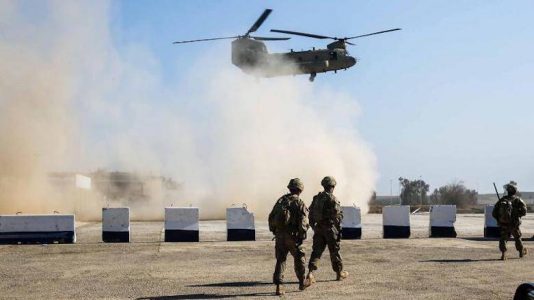
Coalition tallies airstrikes against the Islamic State in Iraq and Syria
The Coalition against the so-called Islamic State released, on Tuesday, a statement providing statistics on its airstrikes targeting the terrorist group during January and February.
The Coalition, formally known as Combined Joint Task Force-Operation Inherent Resolve (CJTF-OIR), “conducted a total of 18 strikes consisting of 48 engagements in Iraq and Syria” during February, the statement said.
“In Iraq, CJTF-OIR carried out 10 strikes against Da’esh targets,” the Coalition statement noted, using the Arabic acronym for the terrorist group. Those 10 strikes consisted of 38 engagements.
CJTF-OIR explained that a strike is “one or more kinetic engagements” in the same location “to produce a single, sometimes cumulative effect in that location.”
“For example,” the CJTF-OIR statement continued, “a single aircraft delivering a single weapon against a lone Da’esh vehicle is one strike, but so is multiple aircraft delivering dozens of weapons against a group of Da’esh-held buildings and weapon systems in a compound, having the cumulative effect of making that facility harder or impossible to use.”
The result of February’s strikes against the Islamic State in Iraq was, according to the CJTF-OIR statement, “16 enemies killed, two bed down locations and six defensive positions destroyed,” along with “eight caves closed.”
Thus, one year after the territorial defeat of the Islamic State, it remains a danger, and the fight against the terrorist organization continues.
“The Coalition remains partnered with the Iraqi Security Forces and supports anti-ISIS operations in coordination with the Government of Iraq,” Col. Myles B. Caggins III, Coalition military spokesperson, told Kurdistan 24.
“The Coalition has embedded advisors from several nations at the Iraqi-led Joint Operations Command-Iraq and collaborates around-the-clock on counter-Da’esh missions and security,” he added.
In Syria, in February, “CJTF-OIR conducted eight strikes against Da’esh targets, consisting of 10 engagements,” Tuesday’s statement explained. “This resulted in eight terrain denial operations.”
The strike summary for February revealed a significant increase from the month before when the Coalition “conducted a total of eight strikes, consisting of 13 engagements in Iraq and Syria.”
The increase from January to February was particularly evident in Iraq, where, in January, CJTF-OIR conducted only “one strike against Da’esh targets,” which consisted “of one illumination mission for force protection.”
In Syria, CJTF-OIR strikes in January were similar in number to February. There were “seven strikes against Da’esh targets, consisting of 12 engagements” in January, according to the Coalition’s statement, and they “resulted in seven terrain denial operations.”
Presumably, the limited number of strikes in Iraq in January was a consequence of the tensions that arose between the US and Iraq, following the Jan. 3 assassination of Iran’s Qods Force leader, Qasim Soleimani, along with Abu Mahdi al-Muhandis, the de facto leader of Iraq’s Popular Mobilization Forces, who had gone to the Baghdad airport to meet him.
Yet the Islamic State does not go away, or become less significant, because of problems between Washington and Baghdad. If anything, such tensions provide it more opportunities.
“ISIS is in the re-consolidation stage in Iraq, and it continues to gather strength and probe the vulnerabilities of its enemies,” Nicholas Heras, Middle East Portfolio Manager at Washington’s Institute for the Study of War, told Kurdistan 24.
“The US and the government of Iraq continue to remain pragmatic partners in the fight against ISIS,” he continued. “The increase in US-led Coalition strikes against ISIS in Iraq in February shows that Baghdad and Washington still share a mutual interest in working together to defeat the terrorist organization.”
Source: Kurdistan 24





